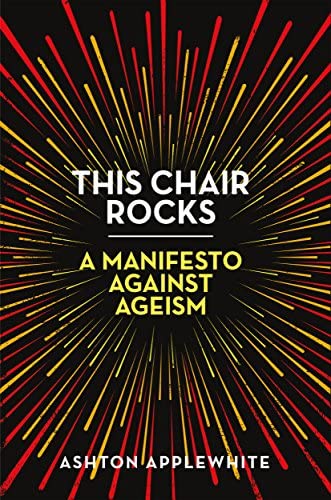
Author: Ashton Applewhite
Topics: Ageism in America, Aging, Discrimination
Summary
“Aging is life itself, which is what makes it so damn interesting.” This Chair Rocks, Applewhite’s witty and compelling manifesto, strives to refocus our negative opinion of aging, debunking common fears and encouraging readers to celebrate aging. Ageism is defined as the “combination of prejudicial attitudes toward older people, old age, and aging itself, discriminatory practices against elders; and institutional practices and policies that perpetuate stereotypes about them.” Just like other “isms” (sexism and racism for example) ageism is socially constructed. We have become brainwashed by a culture that reduces age to the caricatures commonly found in the birthday card aisle. Institutionalized ageism is responsible for producing the cards, and internalized ageism causes them to sell. So much of the anxiety of growing old is a function of the society we live in, and it is “ageism, far more than the passage of time, that makes growing older far harder than it has to be.” Unless we come together to challenge this stigma, it will continue to grow.
Applewhite explores a unique spectrum of topics in this manifesto, including the history of where ageism stemmed from, how age-based stereotypes influence and affect our identity, and the concept of “fluid age,” or looking at age in terms of a spectrum. The term “Old Person in Training” is coined to address the inevitability of aging, encouraging readers to ditch preconceptions and positively embrace the prospect of planning for the future. Chapter six, entitled “Not done yet: the workplace,” is a powerful call to respect the experience and credentials of older workers and transition to a workforce that caters to continued licensing and education so that the most capable and knowledgeable are not pushed out. We need to find fairer and broader ways to assess productivity, devise more ways for older people to continue contributing, support them in their endeavors, and decouple the value of a human being from success along any of the metrics regarding age. Just like the ongoing movements against racism and sexism, it will take a lot of determination and people of all ages to overturn “the way things are.” This includes how the older population is perceived by society. It’s time for a movement against ageism that proclaims, “We’re old, we’re bold, behold!” Ageism may be deeply intertwined in our social and economic structures, but as with any stereotype, it can be dismantled with education and advocacy. “Longevity is here to stay. Everyone is aging. Ending ageism benefits us all.”
You’ll Love This Book If
This book is for you if you’re looking for a wake-up call to the ageism surrounding us, a way to embrace a more nuanced and accurate view of growing older, and a way to cheer up and push back in positive ways to begin dismantling unfair and outdated norms.
If you are looking for a book geared specifically towards the experience of older participants in a corporate workforce, with a concrete strategy to foster a supportive work environment, this book may not fit those needs.
